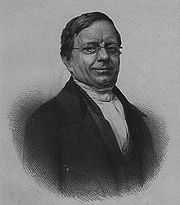
Abraham Jacob van der Aa
Encyclopedia

Amsterdam
Amsterdam is the largest city and the capital of the Netherlands. The current position of Amsterdam as capital city of the Kingdom of the Netherlands is governed by the constitution of August 24, 1815 and its successors. Amsterdam has a population of 783,364 within city limits, an urban population...
, 7 December 1792 – Gorinchem
Gorinchem
Gorinchem , also called Gorkum , is a city and municipality in the western Netherlands, in the province of South Holland. The municipality covers an area of 21.99 km² of which 3.03 km² is water...
, 21 March 1857) was a Dutch literator. He was born in Amsterdam in 1792. His father was a lawyer. From the ages of 6 till 12 he visited the dayschool in Amstelveen. After this he was send to the boarding school of J.E. van Iterson in Aarlanderveen but only stayed there for a year. After a short stay at the Latin school in Leiden, where his parents lived at that time, he was sent to the Seminarium in Lingen, Germany to study the 'dead languages'. After his return in 1810 he went to medical school in Leiden but after his father's death he had to leave. He then did his mandatory military service until 1817. At this point he tried to open a bookshop in Leuven but this wasn't a success so he became a teacher in the Dutch language. After 1839 he only worked as a literator and moved to Gorinchem. He wrote several reference work
Reference work
A reference work is a compendium of information, usually of a specific type, compiled in a book for ease of reference. That is, the information is intended to be quickly found when needed. Reference works are usually referred to for particular pieces of information, rather than read beginning to end...
s; the most famous were a gazetteer
Gazetteer
A gazetteer is a geographical dictionary or directory, an important reference for information about places and place names , used in conjunction with a map or a full atlas. It typically contains information concerning the geographical makeup of a country, region, or continent as well as the social...
and a biographical dictionary
Biographical dictionary
Biographical dictionaries – a type of encyclopedic dictionary limited to biographical information – have been written in many languages. Many attempt to cover the major personalities of a country...
, Biographisch woordenboek der Nederlanden.
The Aardrijkskundig Woordenboek der Nederlanden ("Geographical dictionary of the Netherlands") was a 14-volume gazetteer, published between 1839 and 1851. It was written with the help of a large number of regional historians and other geographers. It covers the Netherlands
Netherlands
The Netherlands is a constituent country of the Kingdom of the Netherlands, located mainly in North-West Europe and with several islands in the Caribbean. Mainland Netherlands borders the North Sea to the north and west, Belgium to the south, and Germany to the east, and shares maritime borders...
, Luxembourg
Luxembourg
Luxembourg , officially the Grand Duchy of Luxembourg , is a landlocked country in western Europe, bordered by Belgium, France, and Germany. It has two principal regions: the Oesling in the North as part of the Ardennes massif, and the Gutland in the south...
, and the former Dutch colonies. It is still used as a reference work, because of the large amount of historical information, even though this has been shown to be unreliable in some cases.
Until his death in 1857 he continued working on his 'biographic dictionary'.

